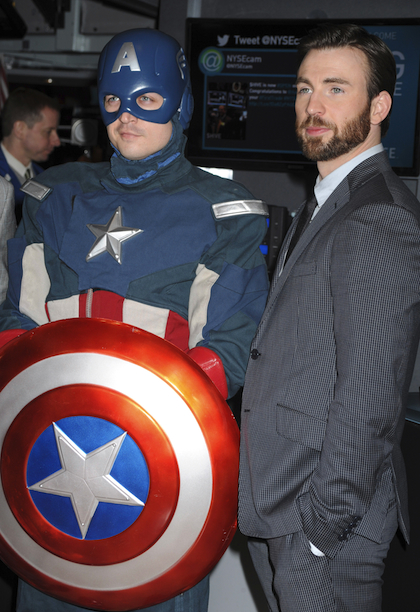'Captain America: The Winter Soldier', AKA How To Do a Superhero Sequel Right

Captain America: The Winter Soldier is the second cinematic outing for everyone's favorite WWII super-soldier and the 9th film to take place in what has come to be known as The Marvel Movie Universe. Over the weekend, it climbed to the #1 spot with a nice little debut haul of $96,200,000 and 65 cents, and it also walked away with an impressive number of good reviews from some of the nation’s top film critics. I’m proud to say that $15 out of that 96 million came from my own pocket, and as far as good reviews are concerned, you can add this article to the bunch.
Why is this latest offering from Marvel Studios being called the Best Marvel Movie To Date? Well, I don’t necessarily agree with that statement, but I can certainly understand why it’s being bandied about. The best of the Marvel movies have always excelled when they bring something new to the table. Of course we all know why The Avengers was so successful. It’s because it was a completely immersive experience that wholeheartedly embraced the action and adventure of its story while still allowing the characters in it room to grow as people. But let’s actually go back to the beginning of the Marvel Movie Universe. We’ll take our Ship of the Imagination to the farthest reaches of the... sorry. I’ve been watching a lot of “Cosmos” recently, and that Neil deGrasse Tyson really makes an impression. Let me begin again...
When the first Iron Man movie debuted back in 2008, we didn’t have much on the table in regards to good superhero movies other than Christopher Nolan’s Batman Begins. People had stopped caring about the X-Men movies, Sam Raimi’s Spider-Man series had concluded, and Green Lantern was but a vague idea that nobody wanted to persue (or shouldn't have, at least). So people were thrilled when they left the theaters after seeing Iron Man because finally they had been given a well-crafted roller-coaster ride of a film that was anchored by a strong and obscenely entertaining main character. The movie was seen as refreshing because it was not centered around bleakness and angst-ridden characters, and that freshness made it a success.
New things are often popular just for the mere fact that they are new. In this day and age, with the overload of entertainment options, the thing that makes the biggest splash will get noticed and appreciated. So, when Iron Man 2 came out, some people, including myself, were a little disappointed because it didn’t really do anything fresh with the character. Then we got Thor (my favorite of the Marvel solo films) and things got put back on track because we were given a new story with an absolute genius handling of comedy, and a main villain who was actually interesting because we could, in some ways, relate to him and sympathize with him. Then came Captain America: The First Avenger. I know there was an Incredible Hulk movie in the mix somewhere, but I honestly don’t remember anything about it other than Tim Roth getting kicked by The Hulk.
The first half of Captain America: The First Avenger was a strong origin story that presented a unique kind of hero. By now, we were used to heroes that became who they were in the face of past wrongs or in an attempt to better themselves as people. Steve Rodgers didn’t have a dark past or a mountainous ego to overcome. He was merely a nice guy who wanted to help people because he knew firsthand what it was like to be belittled and bullied. He’s just a genuinely good person, and on paper, that might sound like kind of a boring character. The trick to making that character work is by providing him with obstacles that make him question his actions and beliefs. The second half of Captain America: The First Avenger didn’t do that, and all we really got was a standard story about a hero trying to stop a madman from taking over the world. His origin story is all well and good, but it’s not nearly as interesting as when he eventually assumes his role as a man out of his time who is forced to confront a different world and the idea that the people he should be fighting might be the ones that he is fighting for. And that is what you’ll get when you go to see Captain America: The Winter Soldier.
Captain America 2: Electric Bucky-Roo stands out from the other Marvel movies for reasons other than a restrained use of CGI. It has a much slower and less frenetic tone which actually allows the audience to become absorbed in the story at hand. Characters are given time to react and feel things without the unneeded pressure of jumping to the next action scene. This may also be the most violent out of all the Marvel Universe movies, but the film should not be applauded for merely the sake of said violence. The film deserves accolades because each death and disaster carries weight, which allows for the stakes to become that much higher and more important. Now, this isn’t exactly a new way of thinking in terms of filmmaking, but in a world filled with bloated summer blockbusters, it’s nice to see that we can have an exciting and adventurous story that can also be thoughtful at the same time.
The Winter Soldier is an excellent addition to the Marvel Movie Universe and a special one in that it can stand on its own two feet without the support of the other Avengers. By the end of the film, I wasn’t only made to feel excited about the upcoming Avengers: The Age of Ultron, which is what I though the filmmakers would go for. Instead, I was left with a desire to continue with the adventures of just one lone Avenger. Marvel Studios and directors Joe and Anthony Russo should be proud of their accomplishment. As we march on towards the end of Marvel’s Phase 2 and enter into Phase 3, I hope that future filmmakers will be given the opportunity to step outside the box and create more exciting films that depend less and less on their successors. If they concentrate on the now, then the future will take care of itself.
(Photo via Dennis Van Tine/Future Image/WENN)




